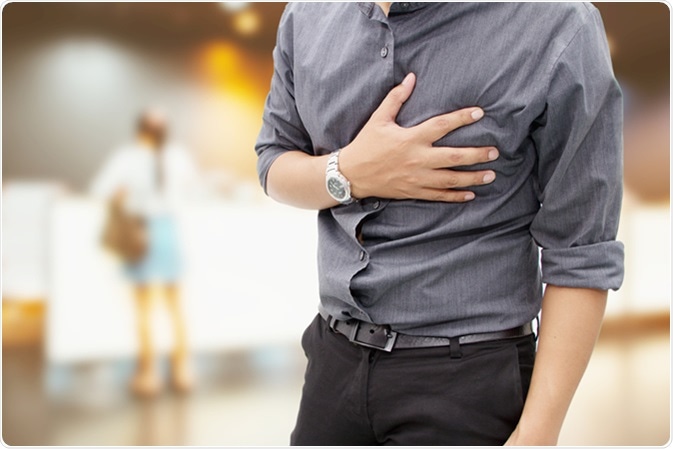
Reducing Chest Pain Caused by Anxiety
Chest pain is one of the most common symptoms associated with anxiety/panic attack. Chest pain due to anxiety could be cardiac or non-cardiac in origin. However, various therapies and medications have proved beneficial in minimizing anxiety-induced chest pain.

Image Credit:NamtipStudio / Shutterstock
Introduction
Panic disorder is a common mental condition affecting 1 – 4 per 100 people. Repeated episodes of anxiety coupled with continuous worry or behavioral changes may lead to symptoms like chest pain.
Chest pain is present in between about 20% to 70% of panic attacks. About 18% - 25% of patients in emergency hospital units who have chest pain have panic disorder. The chest pain due to anxiety means that such patients unnecessarily undergo cardiac tests; however, the true cause still remains undiagnosed in many instances.
Chest pain is present in between about 20% to 70% of panic attacks. About 18% - 25% of patients in emergency hospital units who have chest pain have panic disorder. The chest pain due to anxiety means that such patients unnecessarily undergo cardiac tests; however, the true cause still remains undiagnosed in many instances.
What are the various reasons for chest pain due to anxiety?
Various factors contribute to chest pain caused by panic attacks, classified into cardiac or non-cardiac causes. Chest pain is due to cardiac origin, which means the blood supply to the heart is reduced, which is referred to as coronary spasm or ischemia. However, chest pain that is non-cardiac in origin may originate from musculoskeletal systems, the esophagus or other organs which are unrelated to the heart.
Some reasons for chest pain due to anxiety include:
Non-cardiac reasons – the pain may originate in the musculoskeletal system or esophagus. It may also be due to hyperventilation (episodes of rapid or fast breathing), which may cause the muscles of the intercostal chest wall to tense ot go into spasm. Anxiety may also lead to esophageal dysmotility which can cause esophageal spasm, which is one of the reasons for chest pain.
Cardiac reasons – Cardiac pain due to anxiety can also be due to the direct action of anxiety-linked mechanisms on the heart. The pain may be due to autonomic stimulation along with the impact of episodes of hyperventilation. The combination of these factors may result in the contraction of the muscular wall of the coronary arteries that supply heart muscle (coronary artery spasm).
Coronary artery spasm can lead to reduced blood supply to the heart, thereby causing an oxygen deficit to the cardiac muscle. This results in cardiac chest pain. In addition to these factors, anxiety can aggravate chest pain in individuals with a past history of heart disease, primarily due to the increased need for myocardial oxygen because of a faster heart beat and increased blood pressure.
Small- vessel ischemia - Anxiety may also result in contraction of the small vessels of the heart, due to sympathetic overactivity. Panic attacks and the associated stress or hyperventilation episodes may lead to a spike in microvascular tone and chest pain.
It is also important to note that panic disorder may occur in association with actual ischemia of the heart muscle because of the way the heart and respiratory system change their functioning during these attacks. This is mediated by increased sympathetic stimulation. The ischemia in turn causes pain and further anxiety. This sets in motion a vicious cycle.
How is anxiety-induced chest pain differentiated from that of a heart attack?
It is difficult to differentiate between the two forms of chest pain. However, some of the following symptoms may help to distinguish these forms:
- Chest pain due to a heart attack is caused by exertion, whereas anxiety chest pain is associated with anxiety and can occur even at rest
- Chest pain due to a heart attack increases to a maximum within a few minutes, or remains constant; that due only to anxiety can be brought on or aggravated by pressing over the painful area
- Chest pain due to anxiety is sharp and stabbing in nature and felt over a small area; ischemic pain is experienced as pressure, fullness, an ache or a pain
- Chest pain due to a heart attack may radiate to the arms, back, shoulders, neck, throat or the jaw
What can be done to reduce chest pain caused by anxiety?
Chest pain due to anxiety is a treatable condition. However, it is imperative to seek professional help if one has chest pain. A correct diagnosis is essential to identify the exact cause of chest pain. The physician will identify the cause of chest pain based on history and various physical examinations.
Pharmacologic and psychotherapeutic therapies may be used to treat chest pain due to anxiety.
Selective serotonin receptor inhibitors (SSRIs) and benzodiazepines are two classes of drugs used to treat panic attacks. These drugs are highly effective and are used for frequently occurring panic attacks. However, benzodiazepines are usually avoided in patients who are alcohol or drug abusers.
Various psychotherapy techniques like talking therapies, and especially cognitive behavioral therapy (CBT), have proved beneficial in treating chest pain due to anxiety. Once a correct diagnosis is made, the following lifestyle modifications and home remedies may be used to treat chest pain:
Deep breathing can have a calming effect on body and mind. This technique can normalize the heart rate. First inhale the air for 10 seconds, hold it back for one second and then again exhale for 10 seconds, to bring down chest pain.
Mind-calming techniques - Some simple steps like diverting the attention towards pleasant things or places can relieve the anxiety. It may lead to a slow feeling of relief from the symptoms of panic disorder like chest pain. The patient should realize that chest pain due to anxiety is not life threatening; being optimistic and relaxed can help in relieving chest pain.
Maintaining general health - Performing regular exercise, managing stress with proper techniques and coping strategies, getting enough sleep and eating a well-balanced diet may also prevent the recurrence of panic attack symptoms like chest pain. Cutting out caffeine, smoking and alcohol are also important as these may aggravate anxiety.
Sources
Further Reading
Last Updated: Feb 26, 2019






















.png)












No hay comentarios:
Publicar un comentario